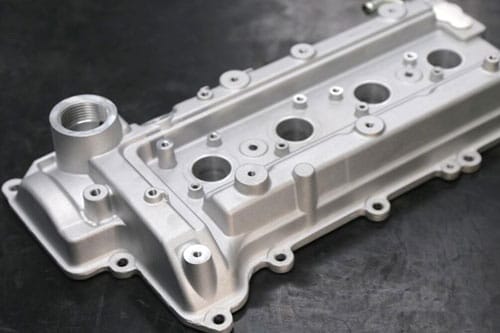The Important Usages of Aluminum Foundry in Various Industries and Their Impact
Aluminum factories serve as an essential resource within numerous markets. Their lightweight and sturdy materials considerably boost performance in automotive, aerospace, building, and electronics industries. As each industry leverages light weight aluminum's special homes, they also add to sustainability efforts. This multifaceted effect prompts a much deeper exploration of exactly how Aluminum formed these industries. What certain advancements and advantages develop from its use?
Automotive Sector Applications
The vehicle market significantly counts on Aluminum Foundry applications to boost lorry efficiency and effectiveness. Light weight aluminum's lightweight nature contributes significantly to fuel economic situation, making it a recommended choice for makers aiming to minimize emissions and boost total vehicle characteristics. Parts such as engine blocks, transmission housings, and wheels are generally created with Aluminum casting processes, permitting elaborate layouts that fulfill strenuous security and performance standards.

Aerospace Innovations

Additionally, the usage of aerospace-grade Aluminum alloys enhances resistance to corrosion and tiredness, vital for the demanding atmospheres aircraft face. Innovations in additive production likewise enable fast prototyping and customization of elements, minimizing lead times and expenses.
Construction and Infrastructure
While the building and infrastructure fields remain to advance, Aluminum shops are progressively identified for their contributions to modern building techniques. Aluminum's lightweight nature and high stamina make it an excellent material for various architectural applications. Factories supply elements such as light beams, frameworks, and facades that enhance the longevity and long life of structures and facilities tasks.
Light weight aluminum's deterioration resistance plays a crucial duty in extending the life expectancy of frameworks revealed to severe ecological problems. The energy effectiveness of Aluminum products also lines up with sustainable building initiatives, contributing to reduced energy intake in building. Additionally, innovative spreading strategies have broadened the design possibilities, allowing architects and designers to create cosmetically pleasing yet functional frameworks.
Electronics Production
Aluminum shops play a considerable function in the electronics producing sector, where the need for light-weight and thermally conductive materials is extremely important. Aluminum Foundry. Components such as heat sinks, coverings, and brackets are typically created using Aluminum because of its outstanding thermal properties and ability to dissipate warm effectively. This is crucial in electronic gadgets, where overheating can result in failing and reduced performance
The convenience of Aluminum enables for complex layouts and accurate machining, which are important in modern-day electronics. On top of that, light weight aluminum's non-magnetic properties make it ideal for applications in delicate digital tools, lessening disturbance. Furthermore, aluminum's resistance to rust boosts the durability of electronic elements, ensuring long life and dependability.
Sustainability and Recycling Efforts
Provided the enhancing focus on environmental obligation, the Aluminum Foundry market has made substantial strides in sustainability and recycling initiatives. Aluminum is naturally recyclable, enabling foundries to recover and recycle material with marginal power expense contrasted to main production. This closed-loop recycling process not just lowers waste but additionally these details lowers greenhouse gas emissions, adding to a much more lasting production design.
Furthermore, several foundries are embracing energy-efficient innovations, including renewable resource resources, to power their procedures (Aluminum Castings). This shift not only decreases reliance on fossil gas but additionally boosts general operational performance
Industry cooperations are more advertising lasting techniques, such as sharing finest techniques and establishing innovative reusing my response approaches. By prioritizing these initiatives, the Aluminum Foundry field is placing itself as a leader in sustainable manufacturing, aligning with worldwide targets for sustainability while fulfilling the needs of different sectors.

Regularly Asked Concerns
What Are the Main Advantages of Making Use Of Aluminum in Foundry Processes?
The key benefits of utilizing Aluminum in Foundry processes include its lightweight nature, excellent rust resistance, high thermal and electrical conductivity, and versatility, enabling for detailed styles and reliable recycling, eventually improving total manufacturing performance and decreasing prices. - Aluminum Foundry
How Does Aluminum Foundry Effect Product Lifecycle Administration?
Aluminum Foundry greatly improves item lifecycle monitoring by making it possible for effective material use, minimizing waste, and facilitating recycling. Its light-weight residential properties enhance transportation efficiency, while longevity expands product life-span, ultimately adding to sustainability and cost-effectiveness in manufacturing.
Are There Details Challenges in Aluminum Foundry Manufacturing?
Certain difficulties in Aluminum Foundry manufacturing consist of handling temperature control, making sure worldly top quality, decreasing waste, and adapting to fluctuating market demands. These factors can affect efficiency, price, and total competitiveness within the industry.
What Precaution Are Essential in Aluminum Foundry Operations?
Necessary security procedures in Aluminum Foundry procedures consist of individual safety devices, appropriate ventilation, normal tools maintenance, risk interaction, and emergency situation feedback training. Executing these practices warranties employee security and reduces risks related to high-temperature metal processing.
Just how Does the Cost of Aluminum Compare to Other Steels in Foundry Usage?
The expense of Aluminum is usually lower than that of steels like copper and titanium, making it an economical option for numerous Foundry applications. This affordability adds to its widespread use throughout numerous markets.
Aluminum shops serve as a necessary these details resource within countless markets. The automobile industry progressively relies on Aluminum Foundry applications to boost car performance and effectiveness. The product's recyclability additionally lines up with the sector's press in the direction of sustainability, as recycled Aluminum calls for substantially much less power to process contrasted to key light weight aluminum. Aluminum shops play a substantial duty in the electronic devices making industry, where the demand for lightweight and thermally conductive materials is extremely important. Offered the raising focus on ecological duty, the Aluminum Foundry market has made substantial strides in sustainability and reusing efforts.